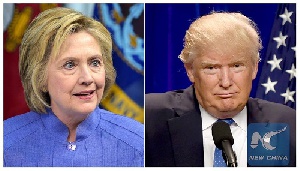 Donald Trump and Hillary Clinton
Donald Trump and Hillary Clinton
The presidential race was extremely close on Tuesday evening, with Republican Donald Trump -- who entered the night as an underdog – seizing the advantage over Democrat Hillary Clinton in a series of battleground states.
By 11 p.m. Eastern time, voting had ended in 49 states, everywhere but Alaska. Together, they represented 535 of the country’s 538 electoral votes.
Trump was on track to prevail in Ohio, a key bellwether state that has backed the losing presidential candidate only once since 1944. The GOP nominee appealed directly to the sense of economic grievance in the Buckeye State, which has been buffeted by a declining manufacturing industry. Locking up the state’s 18 electoral votes boosts his options to getting to 270 electoral votes.
The GOP nominee was also projected as the winner in Florida, another key state, where Clinton had felt confident that a surge in Latino voters would win her the state.
Trump was also the likely winner in the fiercely contested battleground state of North Carolina. That put the Tar Heel State and its 15 electoral votes back in the Republican column -- securing one of the pivotal states that Trump needs for victory. This is the second presidential campaign in a row that North Carolina has gone red, despite a furious effort by Clinton and President Obama to turn out Democratic voters there.
Clinton’s chances were coming down to success in Minnesota, Wisconsin, Michigan and Pennsylvania – all states that Trump aggressively contested in the final stretch of the race.
Even Trump supporters were stunned by the direction of the race.
Austin Daily, a 20-year old college student from Troy, N.Y., stood in front of the White House in shock late Tuesday. He came to the White House Tuesday in a blazer and tie prepared to protest a Clinton victory. Now he was getting ready to celebrate.
“Every poll showed a victory for Clinton,” Daily said. “Not one poll showed a Trump victory. Not even Fox News.”
Clinton supporters were buoyed, however, as she was finally projected the winner in Virginia, putting the state’s 13 electoral votes in her column. The late call came after a surprisingly tight contest in the commonwealth, whose blue northern suburbs outside of Washington, D.C. were anticipated to give her a substantial edge. With her victory, Virginia has now gone Democratic for three presidential elections in a row.
Trump had locked down Alabama, Arkansas, Georgia, Indiana, Kansas, Kentucky, Louisiana, Mississippi, Missouri, Montana, Nebraska, North Carolina, North Dakota, Ohio, Oklahoma, South Carolina, South Dakota, Tennessee, Texas, West Virginia and Wyoming, racking up 236 electoral votes.
Clinton was projected to win California, Connecticut, the District of Columbia, Delaware, Hawaii, Illinois, Massachusetts, Maryland, New Jersey, New Mexico, New York, Oregon, Rhode Island, Vermont, Virginia and Washington, giving her 209 electoral votes, according to the Associated Press.
Voting also ended in the key swing states of Arizona, Georgia, Michigan, Nevada, New Hampshire, Pennsylvania, Utah, and Wisconsin. But those pivotal states were too close to immediately call.
Excitement was building inside Trump’s party late Tuesday night at a hotel ballroom a few blocks from Trump Tower. Supporters high-fived each other and excitedly checked their smartphones as the results poured in and Trump’s chances of an upset appeared brighter.
“It’s Florida!” exclaimed Richard Lucy, a 57-year-old investor from New York City, as Fox News called the Sunshine State just before 11 p.m. He leapt up from his seat to cheer the result.
“If we win Pennsylvania, Wisconsin, Michigan and Minnesota, this place is going to go crazy,” added an excited Lucy, who wore a red “Make America Great Again” hat.
A chant of “Drain the swamp!” broke out a few minutes earlier, when Fox news called North Carolina for the GOP nominee.
A party atmosphere in Clinton’s election night headquarters at the Javits Center in Manhattan began to darken mid-evening. When Trump took Ohio, even though his victory there had been predicted, a nervous current passed around the room.
Top Clinton aides who had circulated among the press risers had long since disappeared. The only Clinton campaign staff in evidence as the 11 o’clock hour approached were fairly junior press aides, and they looked nervous and uncertain.
Senior advisers were not answering their phones.
Pop singer Katy Perry’s upbeat address drew somewhat dutiful applause as people checked and rechecked their phones or looked past her to television screens showing coverage of the returns.
New York Gov. Andrew Cuomo delivered a riff on a chant that had become a campaign trail staple, turning “I believe that she will win” into a reassuring ‘I believe and you believe,” but the applause was light.
Clinton herself was about a mile away at a hotel, with no clear plan for when she would come to the hall, selected in no small part because it has a glass ceiling.
Clinton’s growing confidence that she would win had been evident in campaign appearances in recent days, as she appeared relaxed and happy during a whirl of rallies in Florida, North Carolina, Pennsylvania, Ohio and Michigan.
At the same time, she and her campaign aides preached the importance of turning out the vote in those crucial states, warning that staying home could mean the difference between winning and losing.